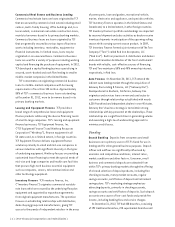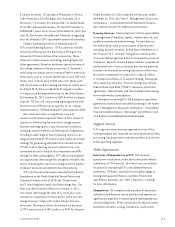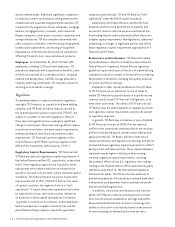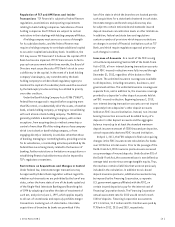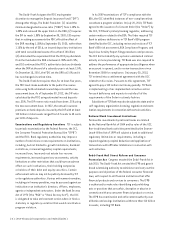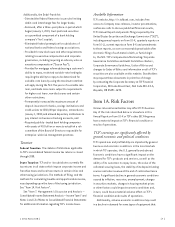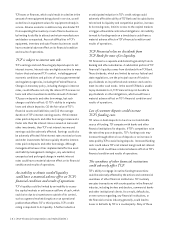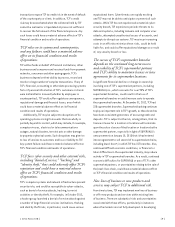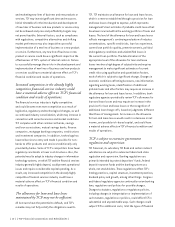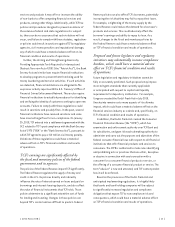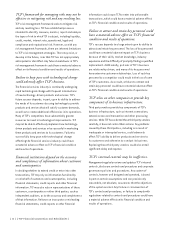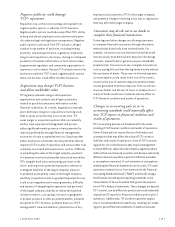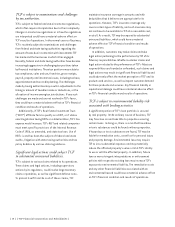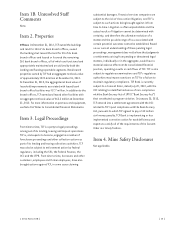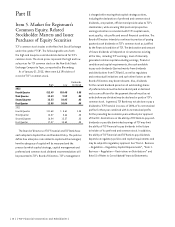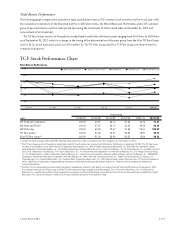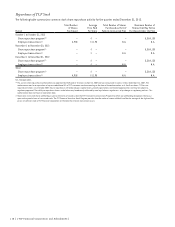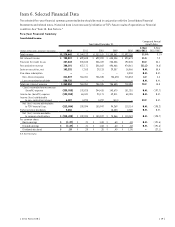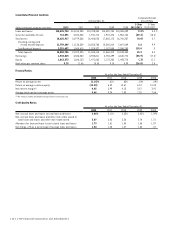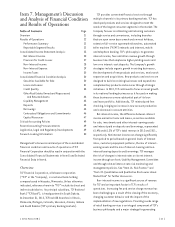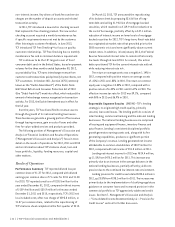TCF Bank 2012 Annual Report Download - page 28
Download and view the complete annual report
Please find page 28 of the 2012 TCF Bank annual report below. You can navigate through the pages in the report by either clicking on the pages listed below, or by using the keyword search tool below to find specific information within the annual report.TCF’s framework for managing risks may not be
effective in mitigating risk and any resulting loss.
TCF’s risk management framework seeks to mitigate risk
and any resulting loss. TCF has established processes
intended to identify, measure, monitor, report and analyze
the types of risk to which TCF is subject, including liquidity,
credit, market, interest rate, operational, legal and
compliance and reputational risk. However, as with any
risk management framework, there are inherent limitations
to TCF’s risk management strategies. There may exist, or
develop in the future, risks that TCF has not appropriately
anticipated or identified. Any future breakdowns in TCF’s
risk management framework could have a material adverse
effect on its financial condition and results of operations.
Failure to keep pace with technological change
could adversely affect TCF’s business.
The financial services industry is continually undergoing
rapid technological change with frequent introductions
of new technology-driven products and services. TCF’s
future success depends, in part, upon its ability to address
the needs of its customers by using technology to provide
products and services that will satisfy customer demands,
as well as to create additional efficiencies in its operations.
Many of TCF’s competitors have substantially greater
resources to invest in technological improvements. TCF
may not be able to effectively implement new technology-
driven products and services or be successful in marketing
these products and services to its customers. Failure to
successfully keep pace with technological change
affecting the financial services industry could have
a material adverse effect on TCF’s financial condition
and results of operations.
Financial institutions depend on the accuracy
and completeness of information about customers
and counterparties.
In deciding whether to extend credit or enter into other
transactions, TCF may rely on information furnished by
or on behalf of customers and counterparties, including
financial statements, credit reports and other financial
information. TCF may also rely on representations of those
customers, counterparties or other third parties, such as
independent auditors, as to the accuracy and completeness
of that information. Reliance on inaccurate or misleading
financial statements, credit reports or other financial
information could cause TCF to enter into unfavorable
transactions, which could have a material adverse effect
on TCF’s financial condition and results of operations.
Failure to attract and retain key personnel could
have a material adverse effect on TCF’s financial
condition and results of operations.
TCF’s success depends to a large extent upon its ability to
attract and retain key personnel. The loss of key personnel
could have a material adverse impact on TCF’s business
because of their skills, market knowledge, industry
experience and the difficulty of promptly finding a qualified
replacement. Additionally, portions of TCF’s business
are relationship driven, and many of its key personnel
have extensive customer relationships. Loss of such key
personnel to a competitor could result in the loss of some
of TCF’s customers. As a result, a failure to attract and
retain key personnel could have a material adverse effect
on TCF’s financial condition and results of operations.
TCF relies on other companies to provide key
components of its business infrastructure.
Third party vendors provide key components of TCF’s
business infrastructure, such as internet connections,
network access and transaction and other processing
services. While TCF has selected these third party vendors
carefully, it does not control their actions. Any problems
caused by these third parties, including as a result of
inadequate or interrupted service, could adversely
affect TCF’s ability to deliver products and services to
its customers and otherwise to conduct its business.
Replacing these third party vendors could also entail
significant delay and expense.
TCF’s internal controls may be ineffective.
Management regularly reviews and updates TCF’s internal
controls, disclosure controls and procedures and corporate
governance policies and procedures. Any system of
controls, however well designed and operated, is based
in part on certain assumptions and can provide only
reasonable, not absolute, assurances that the objectives
of the system are met. Any failure or circumvention of
TCF’s controls and procedures, or failure to comply with
regulations related to controls and procedures could have
a material adverse effect on its financial condition and
results of operations.
{ 12 } { TCF Financial Corporation and Subsidiaries }


